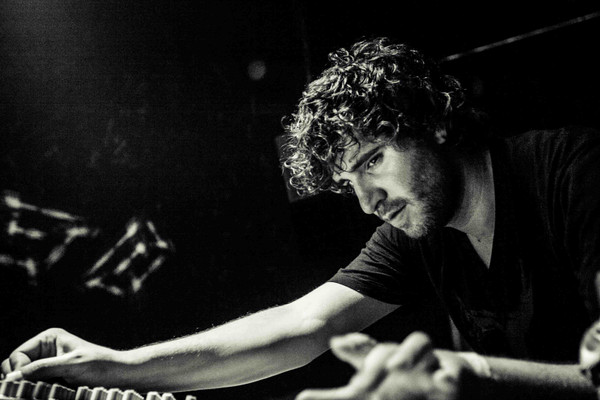


NEWS:
22 hours this month including two sessions and a special tribute to CAN
Artist Info
|
Mathew Jonson  Image from Discogs  Mathew Jonson really is one of a kind. He's developed one of the most distinctive voices in electronic dance music: when you hear one of Jonson's tracks, you almost immediately know it's his. And yet there's no mistaking any given track for another. Mathew Jonson really is one of a kind. He's developed one of the most distinctive voices in electronic dance music: when you hear one of Jonson's tracks, you almost immediately know it's his. And yet there's no mistaking any given track for another. His music offers a rare fusion of populist intensities and nuanced musicality. With a keen understanding for the needs of the dancefloor and the universal laws of house and techno, he's thrown out the rule book time and time again, sneaking tricks learned from electro and even drum and bass into minimal clubs, and loading up his B-sides with tracks that do what they damned well please. His standards for sound and presentation are exacting. Both on stage and in the studio, Jonson's fealty to analog equipment and real-time play — as opposed to mere playback — serves as a standardbearer for a kind of electronic music that goes way beyond the drag-n-drop world of digital composition. Jonson has always been eager to get his hands dirty, and the music reflects that in gnarled bass sequences and long, intuitive lines. His sounds have serious teeth. And despite his quick ascent through the ranks of the techno elite, Jonson hasn't just stayed personally grounded. He's devoted much of his energy to supporting his own close musical family, both in the groups Cobblestone Jazz and the Modern Deep Left Quartet, and with his Wagon Repair label, which he cofounded with Jesse Fisk, Graham and Adam Boothby, Frank Meyerhofer and Konrad Black. He studied classical piano as a kid, plus jazz drumming, and played drums in a marching band — thus laying both the melodic and the rhythmic cornerstones of his music today. Plenty of musicians claim to be "classically trained," of course, rendering the phrase all but meaningless. But here's something you might not have known about Mathew: he's actually begun studying piano again, which suggests a musical seriousness that's rare in the world of auto-didact button-pushers. Thanks to his father's work with sound technology, he also got his hands on synthesizers at the age of 9. By the time he discovered hiphop as a young teen, he was recreating its electro-based beats on his own rudimentary setup at home. It was in Victoria, when he was 19, that Jonson met up with the crew that would help guide his musical trajectory: Tyger Dhula, Danuel Tate and Colin de la Plante, who were playing and DJ'ing parties around the area. The four started playing in clubs together, an early version of the group that exists today as Cobblestone Jazz and the Modern Deep Left Quartet. His first record, in 2001, was the first release on the B.C. label Itiswhatitis, appropritately titled "New Identity". Another followed in 2002, and in 2003. That year, he also made his first appearance on Perlon, "Alpine Rocket" — a track he recorded alongside Luciano during his first trip to Europe. And then, suddenly, Jonson was everywhere: Itiswhatitis, Sub Static, Arbutus, Kompakt, M_nus — and every track an anthem. In 2005, Jonson co-founded Wagon Repair, and it's been a blur since, a nonstop series of tours and recordings, solo and with his bandmates. Crucially, he moved to Berlin. Here, he and de la Plante — who moved over at the same time — have set up Cobblestone Jazz' European headquarters, providing not only the launch pad for European tours but, more importantly, the control center for the group's recorded activities. The studio is jawdropping, frankly: a semi-circle full of gear, from old workhorses like the 808 and 909 and SH-101 to unique beasts like their Cwejman and Roland System 100m modular system. Tate's Rhodes piano anchors one corner of the horseshoe, and everything feeds into a massive desk where tracks are mixed and recorded in real-time. Jonson makes his own music essentially the same way — only with two hands instead of eight. Those two hands have come up with some remarkable material. Having perfected his brand of earthshaking epic with tracks like "Marionette", "Return of the Zombie Bikers" and "Symphony for the Apocalypse", Jonson has increasingly turned his efforts towards more personal, introspective music. He hasn't left the clubs behind — his new album, "Agents of Time", features a number of tracks that are as hip-windingy wily as anything he's produced yet, full-on tracks like "Girls Got Rhythm" and "Thieves in Digital Land". But he's also taken advantage of the longplayer format to stretch out and indulge darker moods and slower tempos. You can expect him to be unlocking even more emotions soon — ones you may not have even known you had — when he ramps up with Midnight Operator, a collaboration with his brother Nathan Jonson, aka Hrdvsion. With Nathan also based in Berlin, the two are finding common musical ground, expanding upon the platform they established with their lone, 2007 EP for Wagon Repair as they begin work on an album. Read more on Last.fm. User-contributed text is available under the Creative Commons By-SA License; additional terms may apply. Artist biography from last.fm Some other places to look for information: last.fm Discogs MusicBrainz |
